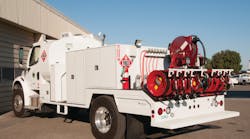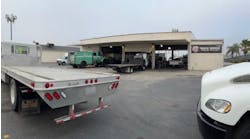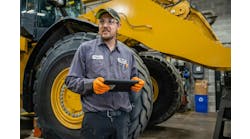Often, fiscal constraints compel fleets to keep some vehicles and equipment in service for much longer than originally intended. As a consequence, maintenance costs increase, availability for vehicle and equipment use decreases and more frequent inspections and services are required. The dilemma becomes: When to replace aging vehicles and equipment rather than continue to repair them?
Typically, the overriding factor is money. But for the County of Fresno’s Fleet Services Division, facing the repair versus replace quandary on its aging fleet of mobile fueling and service trucks, the determining factor was - of all things - government regulations.
Fresno, nicknamed the Raisin Capitol, is located in the heart of California’s San Joaquin Valley, an area known for its large agricultural production. The fifth largest city in California, it is located south of Stockton and north of Bakersfield.
Fresno County covers some 6,000 square miles. Fleet Services manages the County’s vehicle and construction equipment fleet. Under the direction of Allen Moore, Fleet Services Manager, and Dennis Kerns and Greg Buckley, Fleet Services Supervisors, the division is responsible for the fleet’s maintenance and procurement. This includes fleet planning, acquisition, maintenance and sale of surplus equipment.
All maintenance is performed in one fully equipped shop that operates weekdays with one shift and 31 employees - 16 technicians, three welders, three parts people and the nine support people. The division also operates 19 fueling sites located throughout Fresno County, plus provides transportation services through a centralized motor pool.
Fleet Services’ fleet is composed of 850 cars and light trucks, 150 pieces of construction equipment and 145 heavy duty trucks and trailers, including the four mobile fueling and service trucks, says Moore.
The four mobile service vehicles are operated by employees from the County’s Public Works (PW) Department and each vehicle is domiciled at a specific PW yard, Kerns says. The old trucks were diesel-powered 1980 Ford flatbeds that had been jerry-rigged to serve as field service trucks. The trucks were used to change oil and fluids and do minor repairs and services to the County’s PW equipment in the field.
Despite the age of the trucks, the one element that pushed the decision to replace the trucks was environmental regulations.
In February 2006, the California Air Resources Board adopted the Diesel Particulate Matter Control Measure for on-road heavy duty diesel vehicles operated by public agencies, Moore explains. This regulation mandates that municipal vehicle owners reduce diesel particulate matter emissions from their affected vehicles.
As a result, Fleet Services implemented a diesel emission control plan to meet the requirements for “early implementation status,” he says. By do more up front, this pushed out the compliance date to July 1, 2012.
ACCOUNTABILITY
This just didn’t make good business sense, says Moore. The decision was made to go with new equipment, designed specifically to the application and outfitted with the newest technology.
The objective was threefold: to spec the trucks to achieve operating and maintenance savings, to have the vehicles well-organized for quick and easy access to maximize jobsite productivity and to gain better control and accountability for the metered or pulsed consumables, such as gasoline and diesel, being dispensed into the construction equipment.
This type of accountability has been in place at all of the County’s fueling facilities for the past 15 years, he notes. Each location is equipped with an E.J. Ward automated fuel management system (www.ejward.com) to help assure the security and accountability of fuel.
Fleet Services uses the FleetFocus fleet management software from AssetWorks (www.assetworks.com), a provider of fleet asset and maintenance management solutions. Moore says FleetFocus is used to track all functions related to the maintenance of vehicles and equipment, including processing repair and preventive maintenance work orders, capturing operating expenses and doing billing and tracking for vehicle equipment usage.
It was decided to incorporate AssetWorks’ FuelFocus - a real-time automated fuel management system - on the new mobile service trucks. The system will help improve accountability for assets pumped from the service trucks, lower overall fuel expenditures, reduce “shrinkage” - waste and abuse - through automated fuel dispensing and provide timely fuel consumption data, says Moore.
FuelFocus processes the transfer, receipt and issue of all fuel. When integrated with AssetWorks’ FleetFocus fleet management software, data captured by FuelFocus is added in real-time into a single, centralized database, saving time and improving accuracy.
Fresno County had its FuelFocus hardware and software configured as a Vehicle Data Collector (VDC) to gather dispensing information, he explains. Using a radio frequency (RF) antenna, the VDC wirelessly transmits directly into Fleet Services’ FleetFocus maintenance database.
The data collected by the FuelFocus Mobile Fuel Controllers is transmitted any time one of the four mobile fueling and service trucks passes within the wireless collection points’ transmission radius of about 500 feet at the fueling locations where the trucks normally assigned. The information is transmitted instantly, without human intervention or action, Kerns adds.
Prior to the decision to go with the FuelFocus automated fuel management system, Fleet Services worked with Fresno County’s IT department to establish the functionality of the system, how well it would work with the current fleet maintenance and management software systems and if it would it meet the operational needs of the PW department, says Moore.
SPECIFIC REQUIREMENTS
The first step in the replacement process was to decide upon the specifications and requirements for the mobile fueling and service trucks, Kerns says. While the basic parameters to meet the needs of the Public Works Department were known, Fleet Services personnel sought input from all stakeholders, including the drivers of the trucks. The personnel also looked at various makes and models of service trucks.
The objective of all this, he notes, was to gather essential information in order to design an optimum vehicle and body configuration that would serve the needs of the public works department for today and for the next 15 years - the intended lifecycle of the new trucks.
Next, the specs and requirements for the trucks were developed. This was a massive undertaking, according to Kerns, resulting in 10-plus pages of details that were included in the bidding process. Being a government entity, Fresno County uses a formal bidding process that begins with Request for Proposals (RFPs) or Requests for Quotations (RFQs).
Work on the project began in February 2011. The RFQs went out five months later in July. The closing date for the bidding process was August 3, 2011.
Among the specs outlined: setback front axle Model Year 2011 chassis with a gross vehicle weight of approximately 37,000 pounds; front suspension rated at 14,600 pounds; rear leaf spring suspension rated at 23,000 pounds; trailer towing provision; CARB Certified diesel engine rated at 270 hp at 2,000 rpm and 860 ft/lbs of torque at 1,300 rpm with an engine brake; six-speed automatic transmission; and 12 R 22.5 16-ply tires.
There were also comprehensive specs and requirements for the interior and exterior of the cab.
Just as thorough were the requirements and specs for the service truck body, starting with the design and layout of the body, tanks and equipment, based on a step-down and drop-side design with mild steel construction of 10 gauge or heavier. Other particulars included LED lighting; equipment for diesel fuel service, chassis grease service, oil service, gasoline service, water service, drain oil service, air service and pressure wash service; hydraulic system; and work lights and storage.
The contract was awarded to Fresno Truck Center, a full-service Freightliner and Western Star commercial truck dealer in Fresno, CA (www.californiatruckcenters.com). The contract was for a 2012 Freightliner M2 106 chassis combined with a Dean Industrial Enterprises truck service body. The Fresno-based company, the leading lubrication method specialists in the Western United States, has been custom designing, assembling and servicing lube service trucks for more than 50 years (www.deanindustrial.com).
The Freightliner M2 106 is equipped with a Cummins ISC diesel, rated 300 hp and 860 ft/lbs of torque, mated to an Allison 3500 series automatic transmission.
All trucks were operational by July 31, 2012.
Dean Industrial Enterprises designed the units per Fresno County’s requirements to carry diesel fuel, gasoline, chassis grease, two motor oils, hydraulic oil and water, and installed the onboard AssetWorks hardware, says Kerns. Drain oil recovery is provided with provision for draining spent filters.
The diesel fuel pumps, high-pressure wash pumps and the Doosan Ingersoll-Rand air compressors are hydraulically driven. The primary product pumps and reels are Lincoln Industrial (www.lincolnvse.com).
THE FUNDAMENTALS
Overall, the replacement process went according to the timeline established for the project and was successful, say Moore and Kerns.
One of the main reasons for this, they feel, is that by involving all stakeholders and gathering the necessary prerequisite information from them, Fleet Services was able to gain a clear understanding of the application needs and requirements, along with the operating parameters - what the mobile fueling and service trucks are expected to do and how.
Moreover, regular meetings were held with all suppliers throughout the entire trucking building process so that there were no surprises and any problems that cropped up could be addressed more quickly.




